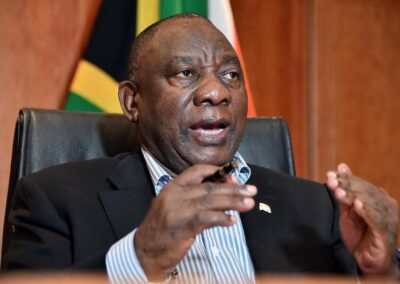South African President Cyril Ramaphosa could be on his way out of the country’s presidential villa, depending on how he can defend the source of US$580,000 allegedly stolen from his home sometime in 2020. The president, who doubles as a farmer, is struggling to convince South Africans that he got the money legitimately.
Following the revelation of the burglary, which has been kept secret by the President and his allies, opposition parties are calling for the President to be removed because he had violated the country’s Constitution and laws.
A panel was immediately set up to find out if the President could be said to have violated any South African law warranting an impeachment. The report of the panel clearly stated that “the President has a case to answer on the proposed charge,” and if found guilty, he could be on his way out as the country’s leader.
Why the clamour for impeachment?
The president’s apartment is supposed to be the most secure apartment in any country. However, on February 9th 2020, thieves broke into Ramaphosa’s private residence inside his farm in Limpopo, stealing as much as US$580,000. The president was attending a summit in Adis Ababa when the incident occurred. The money was allegedly kept on a sofa inside an extra bedroom in the President’s apartment.
A man who lost such an amount of money should be pitied and not persecuted. Unfortunately, that is not the case for Ramaphosa. For opposition parties like the Economic Freedom Fighters (EFF), the burglary’s revelation has exposed a fraud that needs to be dealt with and could be a way to send the president packing. They are not even interested in who stole the money from the president, but the question is how the country’s leader managed to accumulate as much as half a million dollars in his apartment. They say he could have been involved in money laundering.
The crime was unknown to the majority of South Africans until Arthur Fraser, South Africa’s former National Commissioner for the Department of Correctional Services, announced criminal charges against the President and his allies in June of this year.
“The mere fact that President Ramaphosa had large undisclosed sums of foreign currency in the form of US$ concealed in his furniture at his Phala Phala residence is prima facie proof of money laundering in contravention of section 4 of the Prevention of Organised Crime Act No. 121 of 1998,” Fraser said in his petition.
He urged the South African Police Services to investigate and establish the source of the foreign currency stolen from the President’s home.
After an investigation of the panel led by Justice Sandile Ngqobo, a retired Justice of the Republic of South Africa, it was concluded that there was a need to look into the allegations raised by Fraser, as Ramaphosa’s explanation of the source of the currency is not satisfactory.
Ramaphosa’s complicated defense
Ramaphosa has tried hard to defend himself from every allegation in what has become known as the “Farmgate scandal.” According to him, one Mr Mustafa Hazim, a Sudanese, paid the money to purchase 20 buffalos from his Phala Phala farms in Limpopo on Christmas day of 2019. The president attached a payment receipt to his statement.
“It was a payment for the purchase of a number of buffalo referred to above, based on information Mr Ndlovu gave Mr Hazim regarding the price of each of the animals he had identified and decided to buy,” Ramaphosa said in his defence, adding that the US$580,000 was paid in cash.
Interestingly, Ramaphosa did not deny that the stealing happened in his apartment. What he denied was the accusation that he kept the criminal act secret until a third party revealed what happened. Many have said he deliberately covered up the stealing so that no one would question the money’s source.
Regarding the president’s statement and explanation, the panel’s report stated that the “testimony of the President must be approached with caution.”
“Indeed, there are troubling unsatisfactory features in the explanation of the source of the foreign currency given by the President. We do not propose to list all the unsatisfactory aspects,” Thursday’s report stated.
However, the president denied any wrongdoing and insisted that he had always upheld and respected the country’s laws.
“I categorically deny that I have violated this oath in any way, and I similarly deny that I am guilty of any of the allegations made against me,” Ramaphosa said on Wednesday.
Following the release of the panel’s report, Mr Ramaphosa delayed his appearance at parliament on the ground that he was considering the findings of the panel. His spokesperson Vincent Magwenya also cancelled a media briefing that was scheduled for Thursday.
The unanswered questions in Ramaphosa’s statement
While Ramaphosa had tried to explain how the money came about, the panel could not find enough evidence to believe the president’s claims. There are many unanswered questions, and until Ramaphosa is able to provide a satisfactory explanation, he is not to be trusted. Some of the answers needing explanation include the following;
Hazim’s identity
The identity of Mr Mustafa Hazim, the alleged buyer of the 20 buffalos, remains a mirage to investigators. It appears that only Ramaphosa and his farm workers knew who this man was.
In the acknowledgement receipt submitted by Ramaphosa, there was no personal information about the buyer except his name. There was neither an address, a business name, nor a means of identification to verify the existence of the Sudanese businessman.
After an extensive investigation into who Hazim was, Kyle Cowan, a journalist with News24, stated: “Despite extensive searches, utilising various databases and online tools, News24 was not able to immediately verify Hazim’s identity.”
The report stated that until there is sufficient information about Hazim and his whereabouts, the investigation would be incomplete.
Why pay with cash?
The world has grown past the era of carrying cash around. One would expect that a man coming to South Africa from Sudan would prefer to do transactions with electronic banking. However, how Mr Hazim managed to transport the money into the country and to the farm had been contentious.
“We understand that customers pay cash or use money transfers for transactions. Why did Mr Hazim not pay by money transfer?” the report asked. There was also no indication that Hazim declared the amount of money he was carrying when he entered the country.
Why keep the cash for so long?
According to reports, Ramaphosa’s residence was robbed on February 2020. According to Ramaphosa’s statement, Ndlovu, who received the payment on Christmas day, was instructed to keep the money at the farm until the farm’s general manager, Von Wielligh, completes the transaction process. However, being that it was a festive season, and Ndlovu was supposed to go on leave on December 30th, he decided to leave the money in the President’s apartment.
“[Ndlovu] felt uncomfortable about leaving the money in the safe at the Bayeto Centre because he was concerned that several staff members had access to the safe,” Ramaphosa said in his statement. “He decided that the safest place to store the money was inside my private residence on the farm.”
“He stored the money below cushions of a sofa in a spare bedroom that is hardly ever used, inside my private residence, because he thought it was the safest place, as he believed nobody would break into the President’s house,” Ramaphosa added.
If there was a transaction of US$580,000 on Christmas day, why would anyone keep the cash until February? According to the panel’s report, Ramaphosa’s explanation would be incomplete until he explains why the cash was kept in his house for over two months before the burglary.
Hazim paid in full but never returned to take the buffalos
It is December already. In three weeks, it would be exactly three years since the Sudanese businessman Hazim purchased 20 buffaloes from Ramaphosa’s farm. However, there is no indication that Hazim has carried any of the animals or there is any arrangement to do so after paying a staggering $580,000.
“Why would anyone pay such a huge sum of money in cash and thereafter leave the goods without indicating when he would come back to collect the buffaloes or leave an address for the delivery of the animals?” the panel’s report asked. Until Ramaphosa provides satisfying answers to such questions, his possibility of remaining as president remains slim.
Namibian president’s involvement
President Ramaphosa might have approached the situation his way rather than depending on the country’s law. Although he claimed to have reported what happened to the Police, there was no thorough investigation of the matter.
Fraser, in his statement in June, said one of the suspects was believed to be in Namibia. He claimed the South African leader sought the assistance of his Namibian counterpart in finding the man. Officials were said to have met in a secret place where the Namibian leader was told to hand the matter carefully.
Following Fraser’s claim, President Hage Geingob of Namibia released a statement distancing himself from any of the allegations.
“The President of the Republic of Namibia liaises with other Heads of State on official matters, within established State-to-State diplomatic protocols, in accordance with the constitutional powers of the President and upon the dictates of international practices on mutual cooperation between Heads of State and Government,” President Geingob said in a statement.
“The Presidency therefore categorically denies insinuations that President Geingob may have acted inappropriately and/or participated or abetted in the apprehension of the individuals concerned,” the statement added.
Did Ramaphosa engage in paid work?
The South African constitution prohibits the president from engaging in any other “paid work.” If the $580,000 was actually paid for the purchase of buffalos, can it then be said that Ramaphosa had broken the law? The panel could not determine if he had engaged in “paid work,” but they insisted that he had a case to answer.
President Ramaphosa had never denied being a farmer and engaging in the buying and selling of animals. In a recent campaign of his party in Limpopo, Ramaphosa said: “I’m a farmer, I am in the cattle business and the game business… I buy and sell animals.”
Whether his involvement in the business is not in doubt, it would be up to parliament to decide if he had engaged in paid work contrary to the laws governing his actions.
What are Ramaphosa’s chances?
A South African president can only be impeached if there is a “serious violation of the Constitution or the law.” However, no one has the right to pronounce Ramaphosa guilty of any crime until it is proven otherwise. But with the information coming out of the African country, it is unlikely that the 70-year-old would survive an impeachment. It appears that there is no way he would convincingly defend how the money came about. The easiest way to survive an impeachment at the moment is to step aside for his deputy to take over.
Although there is no official statement from the president, there are indications Ramaphosa is already considering leaving his position before the impeachment process gets underway. However, it appears that some of his allies and party men are mounting pressure on him not to leave the country’s top job.
His only chance of remaining as President is that his party enjoys the majority in parliament and the law requires ⅔ majority votes before Ramaphosa could be removed. Should he resign, his deputy would take over from him and that would mean the last two presidents of South Africa resigned over allegations of corruption.







0 Comments